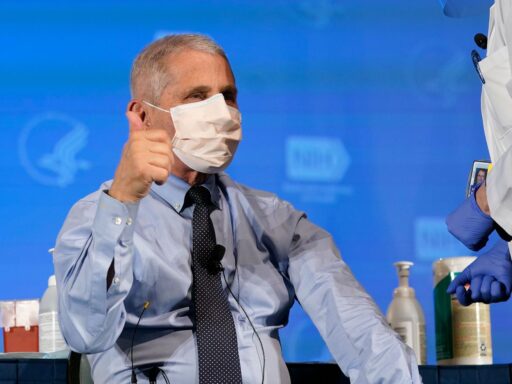Up to half of Americans are expressing vaccine skepticism as political leaders work to alleviate concerns by taking the vaccine publicly.
Dr. Anthony Fauci has been vaccinated, receiving his first dose of the Moderna Covid-19 vaccine on live TV Tuesday morning.
“I feel extreme confidence in the safety and the efficacy of this vaccine, and I want to encourage everyone who has the opportunity to get vaccinated,” he said moments before receiving the injection.
Fauci, the director of the National Institute of Allergy and Infectious Diseases, became a household name as a member of the White House’s coronavirus task force. He is regarded as one of the country’s most respected experts on Covid-19, even as he clashed with President Donald Trump on various precautions during the pandemic, including taking the drug hydroxychloroquine, testing, implementing travel bans, restarting the NFL season, and reopening schools, as Vox’s Dylan Scott reported.
It wasn’t a battle that worked out for the president — a November CNBC poll indicated that while 78 percent of Americans approve of the job Fauci is doing, only 41 percent would say the same for Trump.
In recent weeks, Fauci has turned much of his attention to persuading the American public that the vaccine is safe. Some experts estimate that 75 percent of the population needs to be vaccinated to achieve herd immunity.
WATCH: Dr. Anthony Fauci receives the COVID-19 vaccine shot, saying he has “extreme confidence in the safety and the efficacy of the vaccine” https://t.co/OMrSj3lUAj pic.twitter.com/M8dPrccqGU
— CBS News (@CBSNews) December 22, 2020
As German Lopez wrote for Vox, polls indicate that up to half of Americans are resistant to receiving a vaccine. While these numbers have improved in recent weeks, there is still a concern that vaccine skepticism could derail public health efforts.
“Simply trying to shame people into getting a vaccine isn’t going to work,” Lopez writes. “The public will need to be persuaded — convinced that, as the clinical trials have demonstrated so far, the vaccines are safe and effective.” He says this requires transparency:
With the Covid-19 vaccines, some people can expect to get ill in the hours after a dose — nothing life-threatening or dangerous, but symptoms like fatigue, headaches, chills, and muscle pain have been reported. It’s important, experts said, for officials and health care workers to communicate the symptoms are normal, temporary, a sign that the vaccine is actually working, and worth the benefits of avoiding a much more dangerous illness.
Vaccine skepticism has led many high-profile individuals to get the vaccine publicly, hoping to assuage concerns. Notably, former Presidents Obama, Bush, and Clinton volunteered in early December to take the vaccine together in public. On Monday, President-elect Joe Biden received the vaccine in Delaware, stating “vaccines don’t save lives, vaccinations do.”
Since lockdowns began in the US in March, there has been a clear partisan divide in taking Covid-19 seriously, a dangerous trend that could lead to fewer Republicans receiving the vaccine and stymying the nation’s goal of achieving herd immunity through widespread vaccination. Prominent Republicans getting inoculated early — like US Sens. Lindsey Graham and Marco Rubio, who have posted publicly about receiving the vaccine — could be key to reducing polarization in vaccine adherence.
Author: Jerusalem Demsas
Read More



